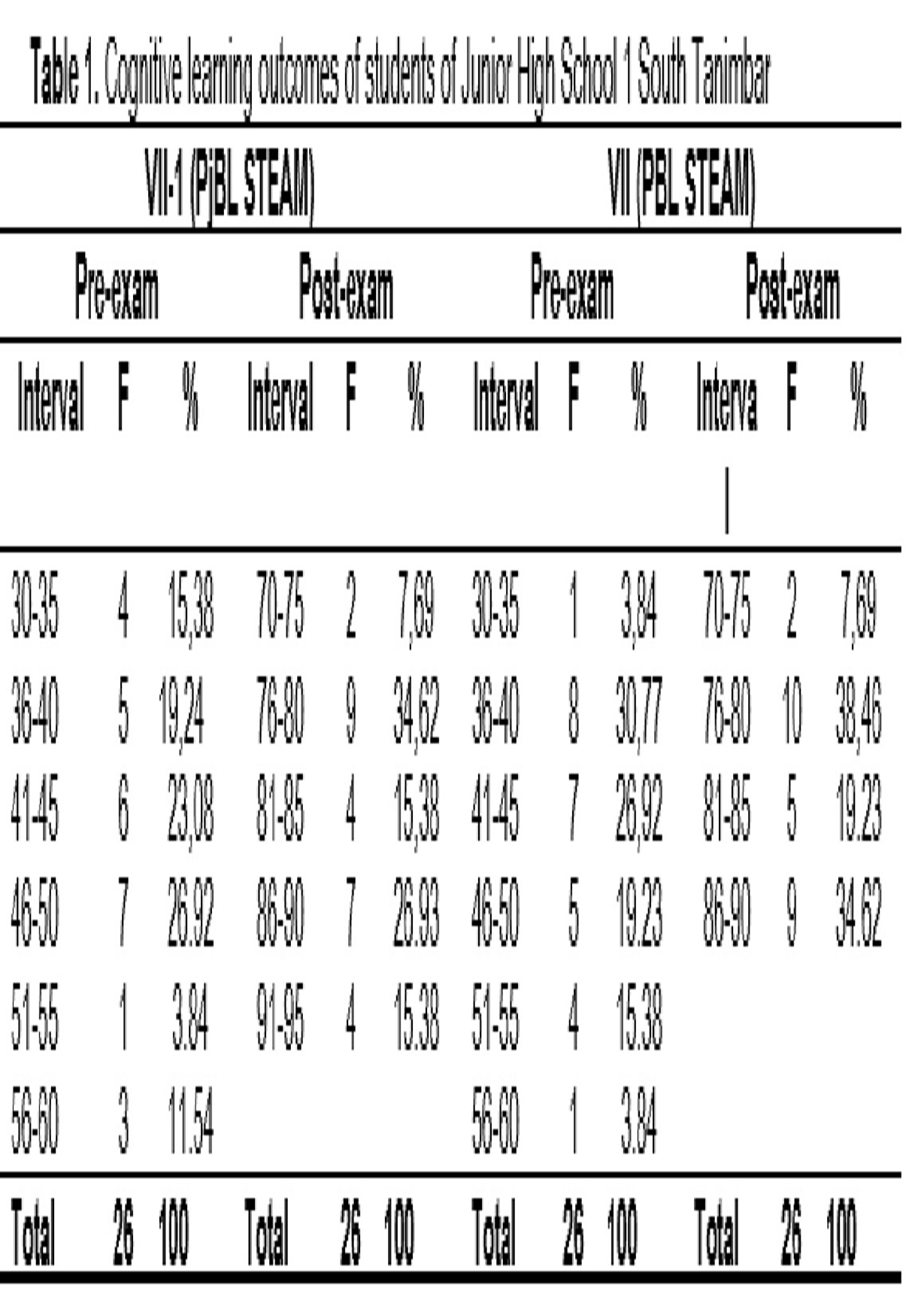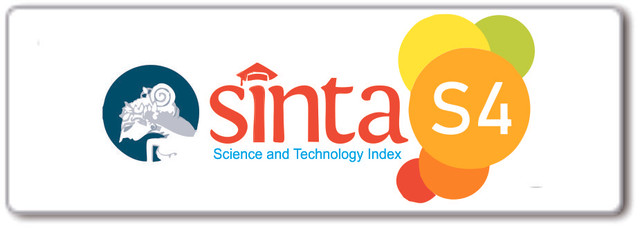Application of PJBL-STEAM and PBL STEAM learning models; improving cognitive learning outcomes, creative thinking and critical thinking of junior high school students inTanimbar Islands Regency
Abstract
STEAM learning is one of the learning innovations that can be applied because it is able to develop 21st century skills. Based on this, the learning models that can be combined with the STEAM approach are project based learning (PjBL) and problem based learning (PBL). The aim of this research is to determine the influence of the PjBL STEAM learning model on cognitive, creative thinking and critical thinking learning outcomes and the influence of the PBL STEAM learning model on cognitive, creative thinking and critical thinking learning outcomes of junior high school students in Tanimbar district. This type of research is quasi-experimental research. The population is all students of SMP Negeri 1 Tanimbar Selatan, SMP Negeri 2 Tanimbar Selatan and SMP Negeri 1 Tanimbar Utara in the even semester of the 2023/2024 academic year with the sample being class VII. Data analysis usingAncova and continued with the LSD test with the help of SPSS Version 27. The research results show thatThere is influencePjBL STEAM learning model on the cognitive, creative thinking and critical thinking learning outcomes of junior high school students in the Tanimbar Islands Regency with a sig value < 0.05 and there is an influence of the PBL STEAM learning model on the cognitive, creative thinking and critical thinking learning outcomes of junior high school students in the Tanimbar Islands Regency with a value sig < 0.05
Downloads
References
Faizah, A. Z. S., Budiastuti., & Peniati, E. 2024. Implementation of Problem Based Learning (PBL) to improve the
activeness and science learning outcomes of Class VII C Students at JUNIOR HIGH SCHOOLN 6
Semarang. National Seminar on Education and Classroom Action Research.
Hikmah, M. 2020. Application of Project Based Learning model to improve students' participation and basic
programming learning outcomes. Jurnal Teknodik, (2): 27-38.
Kusadi, N. M. R., Sriartha, I. P., & Kertih, I. W. 2020. Learning model Project Based Learning on social skills and
creative thinking. Thinking Skills and Creativity Journal, 3 (1): 18-27.
Mar'I, N. R., & Arwin Surbakti, D. S 2020. The Influence of Project Models Based Learning on student learning
outcomes. Journal Pedagogy, 8(1): 36-45.
Marliani, N. 2015. Improving students' mathematical creative thinking skills through the Missouri Mathematics
Project (MMP) learning model. Formative Journal, 5(1): 14-25.
Mu'minah, I. H., & Suryaningsih, Y. 2020. Implementation of STEAM (SCIENCE, TECHNOLOGY, ENGINEERING,
ARTS AND MATHEMATICS) in 21st Century Learning. Bio Education Journal, 5(1): 65-73.
Nita, R. S., & Irwandi, I. 2021. Improving students' creative thinking skills through the Project Based Learning
(PjBL) Model. BIOEDUSAINS: Journal of Biology and Science Education, 4(2): 231-238.
Priantari, I., Prafitasari, A. N., Kusumawardhani, D. R, & Susanti, S. 2020. Improving students' critical thinking
through STEAM-PjBL Learning. Bioeducation Journal, 4(2): 94-102.
Rahman., Muhammad, K., Suharto, Mr. & Iriani, Rilia. 2019. Improving think creative and results study use model
STEAM-based PjBL on electrolyte and non-electrolyte solution material. Journal Of Chemistry And
Education (JCAE), 3(1).
Sigit, D. V., Ristanto, R. H., & Mufida, S. N. 2022. Integration of project-based e-learning with STEAM: An innovative
solution to learn ecological concept. International. Journal of Instruction, 15(3): 23–40.
Sinambela, Y. O., & Setiawan, B. 2023. Application of Problem Based Learning Model to improve students' critical
thinking skills. Eduproxima: Scientific Journal of Science Education , 6(1): 156-163.
Surjana, C., & Wayan. 2019. Functions and Objectives of Indonesian education. Journal of Elementary Education,
(1).
Suryaningsih, S., & Ainun N. F. 2021. Contribution of STEAM Project Based Learning in measure skills process
science and think student creativity. Journal of Education Indonesia, 2(6): 1097–1111.
Wandering, J. B., & Wardani, D. S. 2021. Model Learning Science SD. In Edutrimedia Indonesia (Issue
February).

Copyright (c) 2024 Susan Elwuar, Dominggus Rumahlatu, Sintje Liline

This work is licensed under a Creative Commons Attribution-NonCommercial-ShareAlike 4.0 International License.
Authors who publish with BIOEDUPAT: Pattimura Journal of Biology and Learning agree to the following terms:
- Authors retain copyright and grant the journal right of first publication with the work simultaneously licensed under a Creative Commons Attribution License (CC BY-NC-SA 4.0) that allows others to share the work with an acknowledgment of the work's authorship and initial publication in this journal.
- Authors are able to enter into separate, additional contractual arrangements for the non-exclusive distribution of the journal's published version of the work (e.g., post it to an institutional repository or publish it in a book), with an acknowledgment of its initial publication in this journal.
- Authors are permitted and encouraged to post their work online (e.g., in institutional repositories or on their website) prior to and during the submission process, as it can lead to productive exchanges, as well as earlier and greater citation of published work.








 This work is licensed under a
This work is licensed under a 